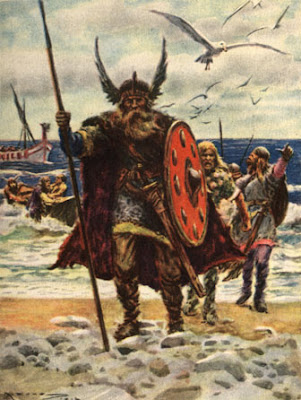Achilles' Heel - Greek proverb
To say someone has an Achilles' heel means that there is a weak spot and everybody has one, or two, since most of us have two legs, its part of what makes us mortal.
The Greek Myth:
Achilles was the son of a mortal father and an immortal mother, the nymph Thetis. It wasn't common for the immortal females to mate with mortal men, although Aphrodite is a notable exception here. Thetis wasn't happy initially when instead of getting to the head honcho, Zeus, or his slightly lower-in-status brother, Poseidon, she was paired off with a Thessalian king named Peleus. Peleus had proven himself honorable to the gods and deserving of a reward, but not of an unambiguous sort. Poseidon and Zeus had turned against Thetis because they had learned that whoever fathered her son, would prove to be much less of a man than the son. The gods couldn't handle it. They knew from personal experience of a couple of generations of similarly ever-enhanced genetics just how dangerous a son could be. Zeus had overthrown his father, and his father had overthrown his by an act of castration. So Peleus was selected because he deserved an honor, but also because the gods really didn't care what happened to him.
Thetis wasn't happy. She was a shape-shifter and tried to get away from Peleus, but Peleus kept hanging on. Perhaps Thetis was impressed with his endurance. Perhaps she got tired. Whatever the reason, Thetis agreed to marry Peleus and produced a son and possible heir, Achilles.
In a moment of maternal bonding, to keep her new-born infant safe, Thetis decided to make him immortal. There were various ways of doing this, but to observers they seemed likely to kill the child. Thetis chose to dunk her baby boy in the Underworld's River Styx. So that he wouldn't drown or float away, she held him by his left ankle. Why she didn't take turns and hold him for a second dunk by the right ankle we'll never know, but that's what Thetis did and the result was that Achilles was impervious to assault, except in the one spot that hadn't been made immortal -- his heel or more specifically, his Achilles' heel.
In the stories about Achilles, you may note that Achilles does indeed get wounded elsewhere on his body, despite the early baptism, and that the writers tend not to specify that an arrow pierced his ankle. Even when his ankle is named, it takes a bit of a leap to believe that as great a man as Achilles would be killed by such a relatively insignificant wound, but that is a version of the legend that struck a responsive chord and stuck around.
Christophe Veyrier Sculpture of Dying Achilles (1683)
Who is Thetis?
Silver-footed Thetis, disposer or the one who places, is encountered in Greek mythology mostly as a sea nymph or known as the goddess of water, one of the fifty Nereids daughters of ,the ancient one of the seas with shape-shifting abilities, Nereus (son of Gaia [Earth] and Pontos [Sea]; whom Hercules seizes in order to extract information pertinent to his labors) and Doris (daughter of the Titans Oceanus and Tethys).In the Trojan War cycle of myth, the wedding of Thetis and the Greek hero Peleus is one of the precipitating events in the war, leading also to the birth of their child Achilles.
Thetis shows up in Homer's Iliad where she offers to get Achilles a new and better suit of armor and shield from the blacksmith of the gods, Hephaestus. Hephaestus was in her debt because Thetis and her sisters had cared for him when Hera threw him down from Olympus.



Comments
Post a Comment